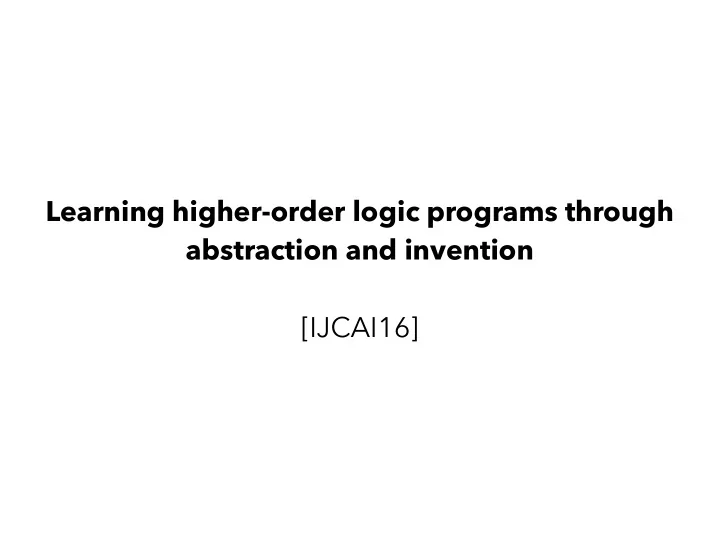

Learning higher-order logic programs through abstraction and invention [IJCAI16]
T T C T C Initial state: Final state:
First-order recursive solution [MLJ2015] f(A,B):-f3(A,B),at_end(B). f(A,B):-f3(A,C),f(C,B). f3(A,B):-f2(A,C),move_right(C,B). f2(A,B):-turn_cup_over(A,C),f1(C,B). f1(A,B):-wants_tea(A),pour_tea(A,B). f1(A,B):-wants_coffee(A),pour_coffee(A,B).
Higher-order solution f(A,B):-until(A,B,at_end,f3). f3(A,B):-f2(A,C),move_right(C,B). f2(A,B):-turn_cup_over(A,C),f1(C,B). f1(A,B):-ifthenelse(A,B,wants_tea,pour_tea,pour_coffee).
Abstraction and invention - robot example Higher-order definition until(S1,S2,Cond,Do) ← Cond(S1) until(S1,S2,Cond,Do) ← Do(S1,S3),until(S3,S2). Abstraction f(A,B):-until(A,B,at_end,f3). Invention f3(A,B):-f2(A,C),move_right(C,B).
HO Reductio predicate n until 1 ifthenesle 1 map 1 filter 2
Previous Metagol (ECAI14,IJCAI15) prove([],H,H). prove([Atom|Atoms],H1,H2):- prove aux(Atom,H1,H3), prove(Atoms,H3,H2). prove aux(Atom,H1,H2):- metarule(Name,Subs,(Atom :- Body)), new metasub(H1,sub(Name,Subs)), abduce(H1,H3,sub(Name,Subs)), prove(Body,H3,H2).
New Metagol with interpreted BK prove([],H,H). prove([Atom|Atoms],H1,H2):- prove aux(Atom,H1,H3), prove(Atoms,H3,H2). prove_aux(Atom,H1,H2):- background((Atom:-Body)), prove(Body,H1,H2). prove aux(Atom,H1,H2):- metarule(Name,Subs,(Atom :- Body)), new metasub(H1,sub(Name,Subs)), abduce(H1,H3,sub(Name,Subs)), prove(Body,H3,H2).
Waiter results Proposition 1: Sample complexity proportional to program size
Chess experiment
Chess results
Programming example 1 Input Output [[i,j,c,a,i],[2,0,1,6]] [[i,j,c,a],[2,0,1]] [[1,1],[a,a],[x,x]] [[1],[a],[x]] [[1,2,3,4,5],[1,2,3,4,5]] [[1,2,3,4],[1,2,3,4]] [[1,2],[1,2,3],[1,2,3,4],[1,2,3,4,5]] [[1],[1,2],[1,2,3],[1,2,3,4]] f3 = droplast f(A,B):-map(A,B,f3). f3(A,B):-f2(A,C), f1 (C,B). f2(A,B):- f1 (A,C),tail(C,B). f1 (A,B):-reduceback(A,B,concat). f1 = reverse
Programming example 2 Input Output [[i,j,c,a,i],[2,0,1,6]] [[i,j,c,a]] [[1,1],[a,a],[x,x]] [[1],[a]] [[1,2,3,4,5],[1,2,3,4,5]] [[1,2,3,4]] [[1,2],[1,2,3],[1,2,3,4],[1,2,3,4,5]] [[1],[1,2],[1,2,3]] f(A,B):-f4(A,C), f3 (C,B). f4(A,B):-map(A,B, f3 ). f3 (A,B):-f2(A,C), f1 (C,B). f2(A,B):- f1 (A,C),tail(C,B). f1 (A,B):-reduceback(A,B,concat). f4 = droplasts
Conclusions • General method of introducing higher-order constructs such as while, until, ifthenelse, map • Leads to reduction in program size • Sample complexity reduction and search space reduction Future work • Invent the higher-order abstractions • Applications in planning, vision and NLP
Bibliography https://github.com/metagol • A. Cropper, S.H. Muggleton. Learning efficient logical robot strategies involving composable objects. IJCAI 2015. • S.H. Muggleton, D. Lin, A. Tamaddoni-Nezhad. Meta- interpretive learning of higher-order dyadic datalog: Predicate invention revisited. Machine Learning, 2015. • D. Lin, E. Dechter, K. Ellis, J.B. Tenenbaum, S.H. Muggleton. Bias reformulation for one-shot function induction. ECAI 2014.
Recommend
More recommend